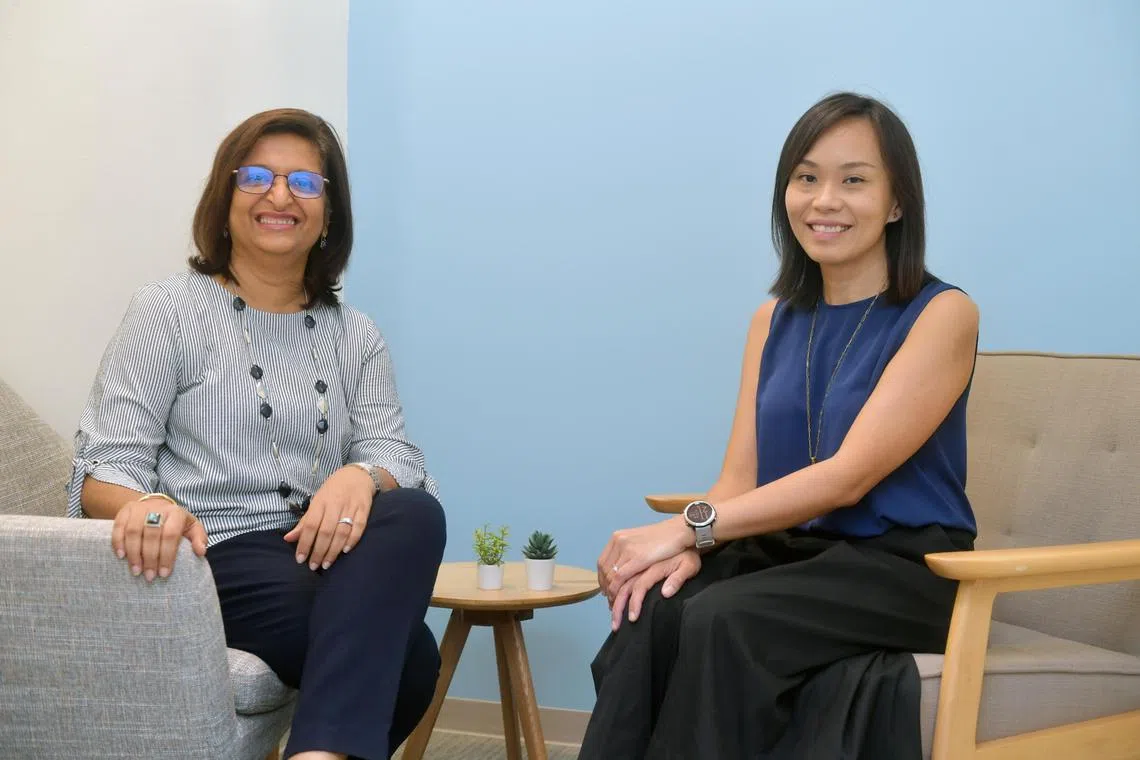IMH youth mental health service trains social service agencies to meet demand
Sign up now: Get ST's newsletters delivered to your inbox

IMH’s medical board chairman Swapna Verma (left) and Chat's team leader Lee Yi Ping.
ST PHOTO: ALPHONSUS CHERN
Follow topic:
SINGAPORE - To meet the growing demand for youth mental health support services, Chat is extending its reach through working with social service agencies and offering more options, including after-hours peer support service Chatline.
The Institute of Mental Health (IMH) youth service has trained staff from six social service agencies to conduct mental health screening since 2020, and will be training those from at least two more in 2023.
The six agencies are Shine Children and Youth Services, Limitless, Singapore Association for Mental Health (SAMH), Fei Yue Community Services, Brahm Centre and Care Corner.
Chat is also training some agencies to conduct mental health assessments. SAMH and Touch Mental Wellness have already started to do these assessments, it said.
Chat, formerly known as the Community Health Assessment Team, started out offering free mental health outreach and assessments to Singapore residents from the ages of 16 to 30 outside the hospital setting. Its expanded role comes amid a significant rise in cases at its only centre, at *Scape in Orchard, where young people can walk in and seek help.
In 2009, when it started operations with two staff, it had 51 cases. By 2019, it had 2,027 referrals. The number grew to 2,081 in 2020 and 2,172 in 2021.
In 2022, with some social service agencies taking on youth cases, increased support options and an improvement in the Covid-19 situation, Chat saw referrals reach 1,231 in the first nine months.
But the number of completed mental health assessments, which shot up in the first year of the pandemic, continued to rise as a proportion of the referrals received. They totalled 1,040 in the first nine months of 2022, and 1,587 for the whole of 2021.
Ms Lee Yi Ping, a principal case manager and team leader for Chat, said that when in-person assessments were suspended for more than two years, case managers spent more time on the phone with each client, during which they could complete an assessment.
It could also have been that most of the referrals came with more challenging issues, which warranted an assessment, she added.
Chat’s text-based webchat service, where young people can chat online with a youth support worker, had 460 users in 2021, up from 279 the previous year. In the first nine months of 2022, the users totalled 403.
Dr Swapna Verma, IMH’s medical board chairman and programme director for Chat, said the aim is to plug the gaps to help more youth as Chat grows. “When we started Chat, the focus was on destigmatising youth mental health and... lowering barriers to help-seeking. I thought we had done a good job looking at our numbers, so then... what is next?” she said in a recent interview.
One issue was the lengthening waiting time. “The minute the waiting time creeps up, young people disengage as they want help there and then,” said Dr Swapna.
Ms Lee said the wait was more than two weeks, and that worsened when the pandemic came and demand rose.
Dr Swapna said Chat thus went ahead to conduct training online for social service agencies in 2020. It also expanded to 16 staff, from seven the year before.
These agencies are funded by the Agency for Integrated Care to conduct mental health assessments under the Youth Integrated Teams (YIT) programme, or outreach and screening under the Community Resource, Engagement and Support Team programme.
Ms Lee said screening determines a young person’s issues and identifies possible coping mechanisms to alleviate the stress. If the person cannot cope and shows signs and symptoms of mental health problems, an assessment would be recommended. This is to see if he or she may have developed a mental health condition like depression, which may require further professional interventions.
With these programmes, SAMH now does outreach and conducts assessments for those aged 12 to 25 who are at risk of having or have mental health issues, at a new centre in Bedok that officially opened in November 2022.
It has been engaged in the youth space with SAMH YouthReach, though this offers support only for young people with diagnosed mental illnesses. SAMH also has a counselling centre open to people of all ages.
At Touch Mental Wellness, assistant director Andrea Chan said it reached out to about 370 young people from March 2021 to April 2022 under the YIT programme, and aims to conduct assessment and intervention for at least 450 people aged 13 to 25 every year.
“We generally see youth presenting with depression, anxiety and even eating disorder symptoms,” she added.
There has been a rise in youth mental health cases in Singapore, similar to the trend seen overseas, though it remains to be seen how that pans out in the long run, said Dr Swapna.
In 2022, preliminary findings from the Singapore Youth Epidemiology and Resilience Study, which involved 3,336 people aged 11 to 18 here, found that about one in three had reported mental health symptoms such as sadness, anxiety and loneliness.
IMH is conducting a nationwide study known as the National Youth Mental Health Study, the results of which will be available by end-2024.
“Of the youth seen by Chat, about 60 to 70 per cent do not need treatment at IMH or public hospitals and are referred to community or school counsellors,” Dr Swapna said.
Stressors, such as academic concerns, relationship problems and adult responsibilities, remained unchanged.
“In the past, they would feel the need to come only if they felt really bad, like if it was really affecting their way of functioning. Now, I think they do seek help earlier when they feel something is not right,” Dr Swapna said of youth clients.
“In the past, they saw it as either you are depressed, or you’re completely well. They didn’t see it as evolving illnesses.”
To cater to the 13- to 25-year-olds looking to message someone about their stress at night and on weekends, Chat started Chatline in the middle of 2022, with funding support from Temasek Foundation. It takes in referrals and trains and supervises the volunteers, who are 17 to 30 years old, who man the text-based platform.
Research is another area that Chat is focused on, said Dr Swapna. “On a national level, we want to create that whole support system for young people with mental health issues.”


